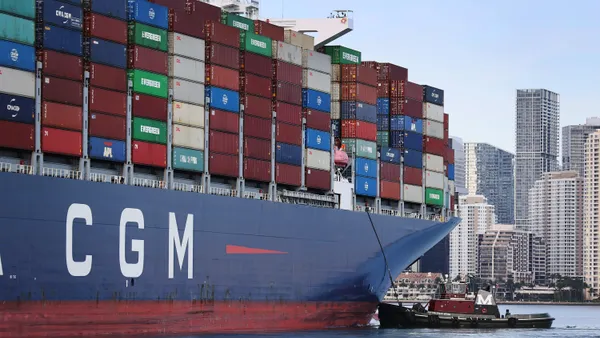Dive Brief:
- Shippers are expected to hold the upper hand in the next round of winter air freight rate negotiations as demand and spot rates continue to decline, according to an Aug. 3 emailed update from Xeneta’s Clive Data Services.
- Shippers have already begun to relaunch contract negotiations with their logistics partners and are looking to secure 12-month commitments to cut costs, said Niall van de Wouw, chief airfreight officer at Xeneta.
- “Many freight forwarders, who at the peak of the pandemic chose multi-year contracts to secure airline capacity, are now reportedly bleeding cash, so they are under significant pressure to renegotiate rates which reflect the reality of today’s freight market and the expectation that the current market environment could continue for the foreseeable future into 2024,” van de Wouw said.
Dive Insight:
While the global air freight spot rate “bottomed out” in the second week of July, it increased during the final week ending July 30, “possibly reflecting an easing decline in cargo volumes and slower paced growth in capacity versus previous months,” according to Clive.
The rise in jet fuel prices might also be contributing to the increase, and are already being reflected in shippers’ monthly rate revisions, according to the report. However, the slight uptick in jet fuel surcharge most likely will not have any significant impact on freight rates if the demand and supply dynamics of the current air freight market remain the same.
“With shippers enjoying leveraging their enhanced buying power after the pricing pain of the pandemic, Xeneta expects a push back on the fuel surcharge adjustments, too,” Clive reported.
Between July 31 and Aug. 4, the average price of jet fuel stood at $2.86 per gallon, compared to roughly $2.82 per gallon from July 24 to July 28, according to the U.S. Energy Information Administration.
“The month of July rarely provides any surprises in terms of unexpected performance levels in the global air cargo market, but what will be concerning airlines and forwarders is the constant month-on-month decline in average rates, and the quickening pace of this fall since the turn of the year,” van de Wouw said. “Going into the usually critical winter rates negotiation period, it’s clear shippers will have the upper hand.”















